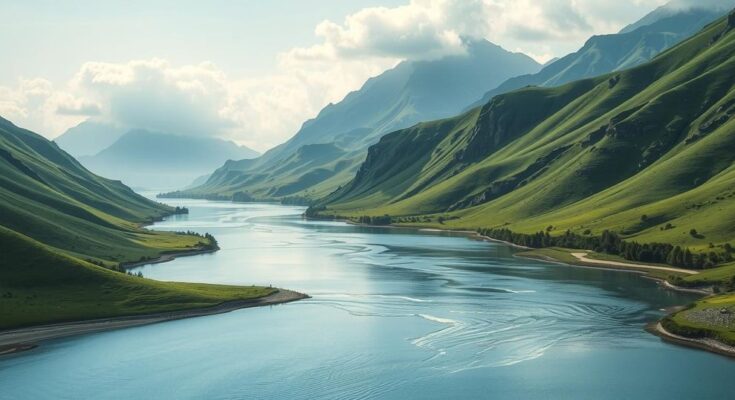The DRC crisis, exacerbated by M23’s territorial gains, invites complex regional interventions. President Tshisekedi seeks to reclaim lost land, blaming Rwanda’s Kagame for support of rebels. Rwanda aims to safeguard its interests while Burundi watches for threats against its regime. Uganda and South Africa also play strategic roles in a multifaceted conflict, where diplomatic solutions are urgently sought.
The crisis in the Democratic Republic of Congo (DRC) has intensified following the M23 rebels’ seizure of territory in the mineral-rich eastern region. This incident has spiraled into a humanitarian and diplomatic emergency, drawing in multiple neighboring countries with a history of interference in Congolese affairs. Presently, different factions, including African nations with military presence in the conflict zone, are grappling to address the ongoing unrest as regional authorities convene to seek resolutions.
Congolese President Félix Tshisekedi plays a pivotal role, aiming to reclaim control over lost territories, particularly Goma, and mitigate the rebel threat. He accuses Rwandan President Paul Kagame of supporting the M23 through military means, alleging an invasion with designs on looting the DRC’s resources. Despite a UN report indicating Rwandan involvement, there is frustration in Kinshasa over the lack of significant international support for his government’s calls for action against Rwanda.
President Kagame of Rwanda stands at the center of this complex conflict, skillfully managing external perceptions. His government denies backing the M23 rebels but emphasizes its right to defend Rwanda against potential threats from armed groups based in the DRC. Kagame maintains that the real resolution lies in addressing the armed factions that threaten both countries, asserting that negotiations should occur directly between Kinshasa and M23.
Burundi’s presence in the conflict adds another layer of complexity, as the nation monitors developments closely. With troops deployed ostensibly to combat Burundian insurgents, Burundi’s government remains vigilant, concerned about spillover effects from increased Rwandan influence into the DRC. President Evariste Ndayishimiye’s warnings highlight fears of an escalated conflict threatening regional stability should the M23 advance toward South Kivu.
Uganda finds itself in a complicated position, actively backing the Congolese army while simultaneously alleged to be offering tacit support to the M23. With a focus on addressing homegrown militants, Uganda’s actions have raised suspicions of ulterior motives in light of its historical exploitative interests in DR Congo’s resources. Analysts suggest Uganda aims to maintain regional influence and prevent Rwanda from dominating the eastern DRC.
South Africa’s involvement further complicates matters, primarily contributing troops to support the Congolese forces. Tensions recently escalated between Rwanda and South Africa after a conflict that resulted in the deaths of South African soldiers, leading to heated diplomatic exchanges and illustrating the underpinning rifts between different regional coalitions concerning the DRC crisis. This division has implications for how various countries choose to engage with the ongoing conflict.
The Democratic Republic of Congo (DRC) is embroiled in a severe crisis following territorial attacks by rebel groups, particularly the M23, in its mineral-rich eastern region. The longstanding history of foreign interference complicates the conflict, as neighboring countries including Rwanda, Burundi, Uganda, and regional blocs respond to the crisis and evaluate their security and political interests. The geopolitical dynamics shape the ongoing response strategies of regional actors and their aspirations within the DRC.
The DRC crisis presents a complex interplay of regional power dynamics, with multiple countries pursuing their interests amidst rising tensions. President Tshisekedi seeks to reclaim control from M23 with foreign support, while Kagame of Rwanda, Burundi, and Uganda navigate their security concerns and historical grievances. The South African military engagement underscores the fragile stability in the region as diplomatic efforts attempt to chart a sustainable resolution to the ongoing conflict.
Original Source: www.bbc.com




